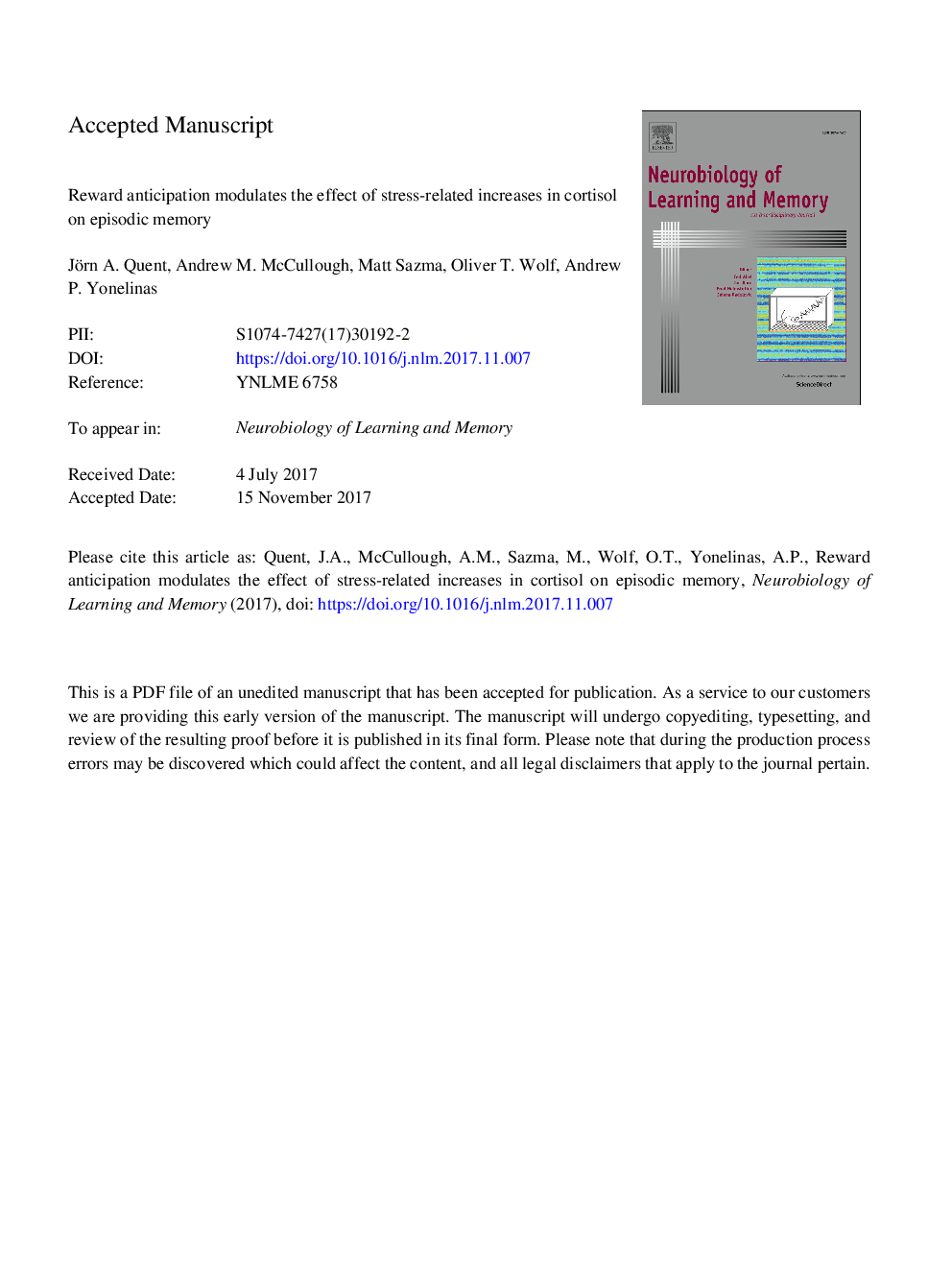ترجمه فارسی عنوان مقاله
پیش بینی پاداش، تأثیر افزایش استرس در کورتیزول را بر حافظه اپیزودیک تعدیل می کند
عنوان انگلیسی
Reward anticipation modulates the effect of stress-related increases in cortisol on episodic memory
| کد مقاله | سال انتشار | تعداد صفحات مقاله انگلیسی |
|---|---|---|
| 112663 | 2018 | 24 صفحه PDF |
منبع

Publisher : Elsevier - Science Direct (الزویر - ساینس دایرکت)
Journal : Neurobiology of Learning and Memory, Volume 147, January 2018, Pages 65-73
ترجمه کلمات کلیدی
پیش بینی پاداش، استرس پس از کدگذاری، حافظه تشخیص، یادآوری، آشنایی، برچسب و ضبط،
کلمات کلیدی انگلیسی
Reward anticipation; Post-encoding stress; Recognition memory; Recollection; Familiarity; Tag-and-capture;
ترجمه چکیده
هنگامی که استرس حاد به زودی پس از وقوع رویداد به حافظه منتقل می شود، این می تواند فراموش کردن رویداد مطالعه، که منعکس کننده تاثیر کورتیزول بر تثبیت است، کاهش می یابد. علاوه بر این، هنگامی که حوادث در شرایط پاداش بالا رمزگذاری می شوند، به نظر می رسد بهتر از آنچه که در شرایط غیر قابل قبول کدگذاری شده اند، به یاد می آیند، و این تأثیرات منعکس کننده عمل سیستم پاداش دوپامینرژیک می باشد. اگرچه هر دو سیستم مدولاسیون تاثیر می گذارد که مناطق حجیم زمانی محدوده ای که برای حافظه اپیزودیک حیاتی هستند، شیوه و حتی اندازه، که این دو سیستم در تعامل هستند، در حال حاضر ناشناخته است. برای پاسخ دادن به این سوال در مطالعه فعلی، شرکت کنندگان کلمات را در شرایط پاداش یا عدم پاداش کدگذاری کرده و سپس نیمی از شرکت کنندگان با استفاده از ارزیابی اجتماعی مطبوعات تحت فشار قرار گرفتند و نیمه دیگر یک کار کنترل بدون استرس را انجام دادند. پس از یک تاخیر دو ساعته، تمام شرکت کنندگان آزمون آزمایشی یادآوری و تشخیص آزاد را دریافت کردند. اثرات قابل ملاحظه ای از استرس یا پاداش در عملکرد کلی حافظه وجود نداشت. با این حال، برای اقلام غیر پاداش، افزایش در کورتیزول مربوط به استرس در شرکت کنندگان استرس مرتبط با افزایش یادآوری و افزایش پاسخ های تشخیص مبتنی بر یادگیری بود. در مقابل، برای اقلام پاداش، افزایش در کورتیزول مربوط به استرس به افزایش عملکرد حافظه مربوط نیست. نتایج نشان می دهد که استرس و سیستم پاداش در نحوه برخورد با حافظه اپیزودیک تاثیر می گذارد. نتایج مطابق با برچسب ها و ترسیم مدل ها به این معنی است که واکنش پذیری کورتیزول تنها می تواند بر روی اقلام غیرواقعی تأثیر بگذارد، زیرا محصولات وابسته به پلاستیک پیش بینی پاداش ارائه شده است.

